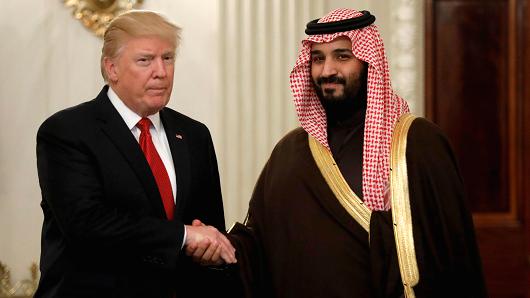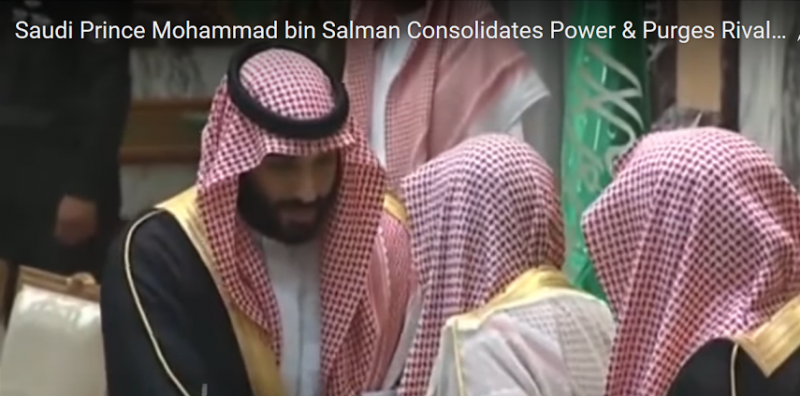Trump may have pushed Saudi Arabia and Iran closer to war
 President Donald Trump and Saudi Deputy Crown Prince and Minister of Defense Mohammed bin Salman meet at the White House in Washington, U.S., March 14, 2017. Kevin Lamarque | Reuters
President Donald Trump and Saudi Deputy Crown Prince and Minister of Defense Mohammed bin Salman meet at the White House in Washington, U.S., March 14, 2017. Kevin Lamarque | ReutersCNBC, “Trump may have pushed Saudi Arabia and Iran closer to war”, 7 Nov 2017:
- Saudi Arabia’s moves over the past few days are bringing it closer to direct war with Iran.
- But this process seems to have been kick started by the new Saudi crown prince’s meeting with President Trump in March.
- It’s crucial to keep this conflict contained to the Middle East.
Crucial news keeps flying out of Saudi Arabia at a frantic pace, but here’s the bottom line: The Saudis are marching ever closer towards a wider regional war. And the U.S. may have helped send them down that path.
Just to recap, in the last several days the new crown prince of Saudi Arabia has initiated a massive purge of dozens of his fellow princes, ministers, and others in the kingdom in what’s been labeled as an “anti-corruption” sweep. Most of the headlines so far are understandably focusing on the one celebrity arrested, Alwaleed bin Talal, the billionaire investor seen and heard frequently for years on financial news channels like CNBC.
But that was just the first wave of news from Riyadh. Since the crackdown began on Saturday, the Saudis have considerably ramped up their accusatory rhetoric towards their neighbors. First, the kingdom squarely blamed Iran for a missile attack on Riyadh from Yemen that was thwarted by the U.S.-made Patriot anti-missile system. The Saudis called that attack “direct military aggression by the Iranian regime and may be considered an act of war.”
Second, the Saudis accused Lebanon of — figuratively at least — declaring “war” against it because of aggression from Hezbollah. That statement spurred even Saudi ally and Egyptian President Abdel Fattah al-Sisi to publicly urge for calm.
al-Sisi may be too late. Because the common denominator in all these Saudi moves is a more focused preparation for a wider and more direct war with Iran for control of the region. As I noted when he was first put in his top position by his father King Salman in June, Crown Prince Mohammad bin Salman was already known as a hardcore hawk against Iran. Just a month before he was made crown prince, bin Salman declared that peace dialogue with Iran was impossible.
“More aggressive anti-Iranian hawks like bin Salman may have seen Donald Trump’s election as an excuse to win the day over more dovish princes and ministers. And the White House seemingly gave Saudi Arabia a green light.”
But the direct line to these more bellicose moves begins earlier than that and goes directly to the White House. While still deputy crown prince, bin Salman visited with President Trump in March of this year. During that meeting, they publicly declared Iran as the key regional security threat in the Middle East. That was step one.
Step two was President Donald Trump’s visit to Saudi Arabia in May. That visit and the Saudi side of that agenda was arranged by bin Salman and was seen as a great triumph for him. The key message from the Trump visit wasn’t that the 31-year-old now heir to the throne was good at event planning. The takeaway came from President Trump’s green light to the Saudis to use new measures to crack down on terrorism in the Middle East. And the Saudis seem to be taking “terrorism” to specifically mean Iranian-backed terrorism and military forces.
Step three came almost exactly a month after that visit, when bin Salman was made crown prince.
Step four seems to have come in September, when bin Salman reportedly secretly visited Israel to discuss Iran and other potential cooperative measures. Neither country is officially acknowledging that visit took place, but at least one Israeli government source confirmed the meeting last month.
Now we’re on step five, which appears to be a combination of the purge to remove any possible internal hurdles towards a greater anti-Iranian push, and blatant protests against any real or perceived Iranian aggression.
There may be more intermediate steps to come, but we can all see where this is leading. A direct conflict between Saudi Arabia and Iran, as opposed to the proxy war they’re fighting in Yemen, looks inevitable.
Speaking of proxy wars, if that direct conflict happens would it make fighting between Saudi Arabia and Iran a U.S. proxy war? The answer seems to be yes, especially when one connects the very clear and sequential dots listed above. The harder question to answer is whether such a war, proxy or not, can be avoided.
The fact is that Iran and the U.S. have been in a state of cold war for almost 40 years. Iran has done almost all of the killing during that period, in terrorist attacks carried out by Iran’s proxies including Hezbollah and other armed groups who targeted U.S. troops during the war in Iraq.
But Saudi-Iranian hatred has been even more intense during this same period. They remain the two leading combatants in the centuries-old Sunni-Shia civil war for Islamic supremacy. Iran is the more powerful military player while Saudi Arabia has more cash and control of the Islamic holy sites of Mecca and Medina.
Enter the last two American presidential administrations. First, the Obama team seemed to be giving Iran a major leg up by promoting the nuclear deal with Tehran and—just as importantly—working to end many economic sanctions and release up to $150 billion in frozen assets back to the mullahs.
Next, the Trump administration comes in vowing to either nix or radically modify that nuclear deal and bashing Iran in a way no other president ever has. More aggressive anti-Iranian hawks like bin Salman may have seen Donald Trump’s election as an excuse to win the day over more dovish princes and ministers. And the White House seemingly gave Saudi Arabia a green light.
Whether the U.S. initiated this or the Saudis took advantage of a new administration, it’s not clear where it goes next. Some kind of peace deal or cooperation agreement between the Saudis and the Iranians does not seem very likely. Remember, their dispute goes beyond and long predates America’s involvement or seeming favoritism to either side.
But if full blown war breaks out directly between the two countries, it’s hard to see the U.S. being able to sit it out without at least some form increased weapons support and other aid. Then it will be up to Iran’s possible allies, like Russia and China to make the next move.
None of these scenarios are comforting. But it’s important to avoid the naive thought that had President Trump and this new crown prince not come along, relative peace would have been sustainable for much longer. Instead of hand wringing about what may or may not speed up the inevitable, all reasonable parties need to figure out how to make sure two countries destined to confront each other like Iran and Saudi don’t end up fighting a war more deadly and prolonged than what we’ve seen in Syria and Yemen for the past several years.
Commentary by Jake Novak, CNBC.com senior columnist. Follow him on Twitter @jakejakeny.
CNN, “Iran’s actions may be ‘act of war,’ Saudi crown prince says”, 7 Nov 2017:
(CNN)Supplying rebels in Yemen with missiles was a “direct military aggression by the Iranian regime,” Saudi Crown Prince Mohammed bin Salman bin Abdulaziz said Tuesday.
In his first direct statements regarding a thwarted missile strike on the Riyadh airport over the weekend, bin Salman laid the blame for the attempt at the feet of Iran’s government, saying it was “supplying its Houthi militias (in Yemen) with missiles.”
In comments reported by the state-run Saudi Press Agency, the crown prince told British Foreign Secretary Boris Johnson that Iran’s actions “may be considered an act of war against the kingdom.”
Saudi Arabia has waged a years-long military campaign in Yemen in support of the internationally recognized government that the Houthi rebels drove out of the capital, Sanaa.
The Iranian-backed Houthis have claimed responsibility for firing Saturday’s projectile at the King Khalid International Airport. The Saudi military was able to intercept the missile before it struck the Riyadh airport.
On Tuesday, Iranian Foreign Minister Mohammad Javad Zarif slammed the allegations that his country supplied the Houthis with missiles.
Zarif “warned of Saudi Arabia’s provocative measures in the region” and “rejected Riyadh’s dangerous allegations as a violation of the international laws and the UN Charter,” the semiofficial Fars News Agency reported.
Bin Salman’s remarks were the latest by the Saudi government to accuse Iran not only of being behind actions in Yemen but also criticizing Tehran over its purported behavior in Lebanon.
Iran sponsors Hezbollah, the Shiite militant and political group that holds tremendous sway in Lebanon’s Cabinet and as part of a pro-Syrian alliance in the Lebanese Parliament.
Announcing his resignation Saturday as Lebanon’s Prime Minister, Saad Hariri blamed Iran and Hezbollah for meddling in “the internal affairs of Arab countries.” Hariri, a Sunni politician with Saudi backing, made the announcement from Riyadh.
“Iran controls the region and the decision-making in both Syria and Iraq,” Hariri said. “I want to tell Iran and its followers that it will lose in its interventions in the internal affairs of Arab countries.”
For the Saudis, there would now be “no more distinction between Hezbollah and the Lebanese government,” Thamer al-Sabhan, Saudi minister for Gulf affairs, said Monday.
Hezbollah “has become a tool of death and destruction against Saudi Arabia and participates in all terrorist acts in the kingdom,” the minister said.
Saudi Arabia, therefore, will treat the Lebanese as “a government declaring war,” Sabhan told Al-Arabiya, the Saudi-backed broadcaster.
It was not clear what this statement would do to Saudi-Lebanese relations, but the minister said the ramifications “would be severe.
The United States considers Hezbollah a terrorist group, but its political wing is the most powerful bloc in Lebanon’s deeply divided coalition government, and several of its politicians are ministers.

The 32-year-old trying to revamp Saudi Arabia
A spokesman for the Saudi-led coalition fighting Houthi rebels in Yemen said Hezbollah militants smuggle weapons through Syria and then Iran before reaching Yemen by sea, even though the coalition has blockaded Yemen’s ports since 2015.
“It was an Iranian missile, launched by Hezbollah from territory occupied by the Houthis in Yemen,” Saudi Foreign Minister Adel al-Jubeir told CNN on Monday.
“Who are the Houthis, and what (is) Hezbollah?
They are subsidies of the Iranian Revolutionary Guard,” Jubeir said.

Posted by Saudi likely auguring war with Iran on Thu, 09 Nov 2017 16:37 | #
Saudi Arabia has ordered its citizens out of Lebanon ‘immediately.’ - That order, in combination with Trump’s actions in regard to Saudi, viz. massive arms sale, presages at least a proxy war with Iran.